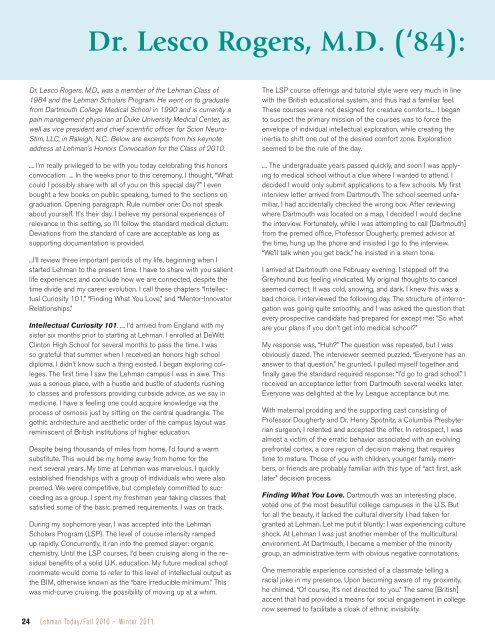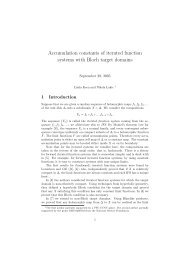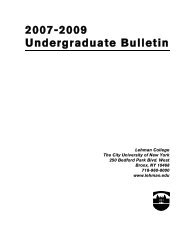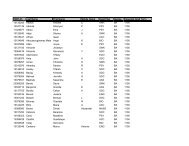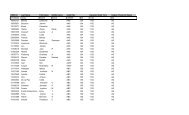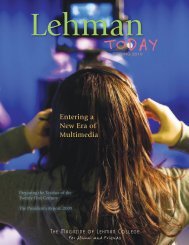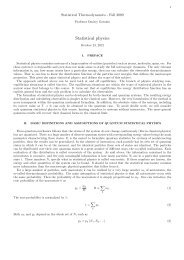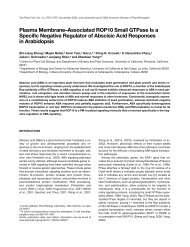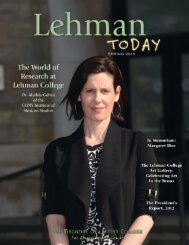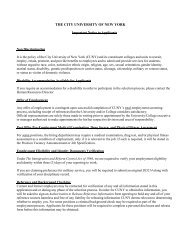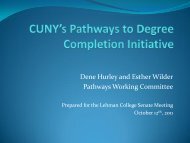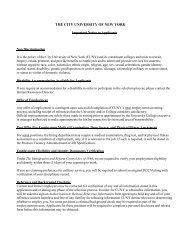Fall 2010 - Lehman College
Fall 2010 - Lehman College
Fall 2010 - Lehman College
You also want an ePaper? Increase the reach of your titles
YUMPU automatically turns print PDFs into web optimized ePapers that Google loves.
Dr. Lesco Rogers, M.D. (‘84):<br />
Dr. Lesco Rogers, M.D., was a member of the <strong>Lehman</strong> Class of<br />
1984 and the <strong>Lehman</strong> Scholars Program. He went on to graduate<br />
from Dartmouth <strong>College</strong> Medical School in 1990 and is currently a<br />
pain management physician at Duke University Medical Center, as<br />
well as vice president and chief scientific officer for Scion Neuro-<br />
Stim, LLC, in Raleigh, N.C.. Below are excerpts from his keynote<br />
address at <strong>Lehman</strong>’s Honors Convocation for the Class of <strong>2010</strong>.<br />
.... I’m really privileged to be with you today celebrating this honors<br />
convocation. .... In the weeks prior to this ceremony, I thought, “What<br />
could I possibly share with all of you on this special day?” I even<br />
bought a few books on public speaking, turned to the sections on<br />
graduation. Opening paragraph. Rule number one: Do not speak<br />
about yourself. It’s their day. I believe my personal experiences of<br />
relevance in this setting, so I’ll follow the standard medical dictum:<br />
Deviations from the standard of care are acceptable as long as<br />
supporting documentation is provided.<br />
...I’ll review three important periods of my life, beginning when I<br />
started <strong>Lehman</strong> to the present time. I have to share with you salient<br />
life experiences and conclude how we are connected, despite the<br />
time divide and my career evolution. I call these chapters “Intellectual<br />
Curiosity 101,” “Finding What You Love,” and “Mentor-Innovator<br />
Relationships.”<br />
Intellectual Curiosity 101. .... I’d arrived from England with my<br />
sister six months prior to starting at <strong>Lehman</strong>. I enrolled at DeWitt<br />
Clinton High School for several months to pass the time. I was<br />
so grateful that summer when I received an honors high school<br />
diploma. I didn’t know such a thing existed. I began exploring colleges.<br />
The first time I saw the <strong>Lehman</strong> campus I was in awe. This<br />
was a serious place, with a hustle and bustle of students rushing<br />
to classes and professors providing curbside advice, as we say in<br />
medicine. I have a feeling one could acquire knowledge via the<br />
process of osmosis just by sitting on the central quadrangle. The<br />
gothic architecture and aesthetic order of the campus layout was<br />
reminiscent of British institutions of higher education.<br />
Despite being thousands of miles from home, I’d found a warm<br />
substitute. This would be my home away from home for the<br />
next several years. My time at <strong>Lehman</strong> was marvelous. I quickly<br />
established friendships with a group of individuals who were also<br />
premed. We were competitive, but completely committed to succeeding<br />
as a group. I spent my freshman year taking classes that<br />
satisfied some of the basic premed requirements. I was on track.<br />
During my sophomore year, I was accepted into the <strong>Lehman</strong><br />
Scholars Program (LSP). The level of course intensity ramped<br />
up rapidly. Concurrently, it ran into the premed slayer: organic<br />
chemistry. Until the LSP courses, I’d been cruising along in the residual<br />
benefits of a solid U.K. education. My future medical school<br />
roommate would come to refer to this level of intellectual output as<br />
the BIM, otherwise known as the “bare irreducible minimum.” This<br />
was mid-curve cruising, the possibility of moving up at a whim.<br />
24 <strong>Lehman</strong> Today/<strong>Fall</strong> <strong>2010</strong> – Winter 2011<br />
The LSP course offerings and tutorial style were very much in line<br />
with the British educational system, and thus had a familiar feel.<br />
These courses were not designed for creature comforts.... I began<br />
to suspect the primary mission of the courses was to force the<br />
envelope of individual intellectual exploration, while creating the<br />
inertia to shift one out of the desired comfort zone. Exploration<br />
seemed to be the rule of the day.<br />
.... The undergraduate years passed quickly, and soon I was applying<br />
to medical school without a clue where I wanted to attend. I<br />
decided I would only submit applications to a few schools. My first<br />
interview letter arrived from Dartmouth. The school seemed unfamiliar.<br />
I had accidentally checked the wrong box. After reviewing<br />
where Dartmouth was located on a map, I decided I would decline<br />
the interview. Fortunately, while I was attempting to call [Dartmouth]<br />
from the premed office, Professor Dougherty, premed advisor at<br />
the time, hung up the phone and insisted I go to the interview.<br />
“We’ll talk when you get back,” he insisted in a stern tone.<br />
I arrived at Dartmouth one February evening. I stepped off the<br />
Greyhound bus feeling vindicated. My original thoughts to cancel<br />
seemed correct. It was cold, snowing, and dark. I knew this was a<br />
bad choice. I interviewed the following day. The structure of interrogation<br />
was going quite smoothly, and I was asked the question that<br />
every prospective candidate had prepared for except me: “So what<br />
are your plans if you don’t get into medical school?”<br />
My response was, “Huh?” The question was repeated, but I was<br />
obviously dazed. The interviewer seemed puzzled. “Everyone has an<br />
answer to that question,” he grunted. I pulled myself together and<br />
finally gave the standard required response: “I’d go to grad school.” I<br />
received an acceptance letter from Dartmouth several weeks later.<br />
Everyone was delighted at the Ivy League acceptance but me.<br />
With maternal prodding and the supporting cast consisting of<br />
Professor Dougherty and Dr. Henry Spotnitz, a Columbia Presbyterian<br />
surgeon, I relented and accepted the offer. In retrospect, I was<br />
almost a victim of the erratic behavior associated with an evolving<br />
prefrontal cortex, a core region of decision making that requires<br />
time to mature. Those of you with children, younger family members,<br />
or friends are probably familiar with this type of “act first, ask<br />
later” decision process.<br />
Finding What You Love. Dartmouth was an interesting place,<br />
voted one of the most beautiful college campuses in the U.S. But<br />
for all the beauty, it lacked the cultural diversity I had taken for<br />
granted at <strong>Lehman</strong>. Let me put it bluntly: I was experiencing culture<br />
shock. At <strong>Lehman</strong> I was just another member of the multicultural<br />
environment. At Dartmouth, I became a member of the minority<br />
group, an administrative term with obvious negative connotations.<br />
One memorable experience consisted of a classmate telling a<br />
racial joke in my presence. Upon becoming aware of my proximity,<br />
he chimed, “Of course, it’s not directed to you.” The same [British]<br />
accent that had provided a means for social engagement in college<br />
now seemed to facilitate a cloak of ethnic invisibility.


